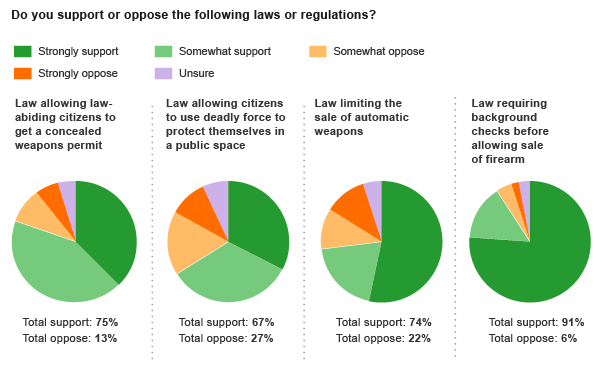|
By Jennifer Connolly July 23rd, 2012 In the wake of the movie theater shooting in Aurora, Colorado, I have heard many friends, fellow scholars, and journalists question why gun control policy hasn’t evolved to more tightly regulate the public’s ability to purchase and carry weapons, particularly assault style weapons. In the last week, there has been a lively and at times vitriolic debate over how the U.S. should change (or not change) our gun control policies. Regardless of my personal stance on this debate, I have a feeling that advocates for stricter gun control are fighting an uphill battle. I am not a gun control policy expert, and I don’t seek to promote any specific policy position in this debate. As the Editorial Assistant for the Journal of Public Policy, I regularly review past issues of the journal and just last week I came across an article on credit claiming and blame avoidance that sheds some light on the current state of gun control policy and why it isn’t likely to change anytime soon. At first it might seem that politicians, seeking re-election or election to a higher office, would support the policy position supported by a majority of the public, as that would gain them favor with the electorate. But the case of gun control policy offers a stark counterexample to that theory. Polls released in the last few years give every indication that a majority of the public is in support of some form of stricter gun control, yet policy doesn’t seem to reflect public sentiment. For instance, 63 percent of people favor a ban on high capacity magazines or clips (January 2011 CBS News poll), 86 percent support requiring all gun buyers to pass a criminal background check, no matter where they purchase the weapon or from whom they buy it (American ViewPoint/Momentum Analysis poll), and 69 percent support limiting the number of guns a person could purchase in a given time frame (April 2012 Ipsos/Reuters poll). With a majority of the public in support of stricter gun control, and with horrific tragedies like the movie theater shooting in Aurora gaining national attention, why aren’t politicians jumping at the opportunity to pass policies that would more strictly control the sale of weapons? Kent Weaver offers a compelling explanation in this 1986 JPP article. While I highly recommend reading the full article, the basic idea is that, from a politician’s perspective, it is very difficult to effectively claim credit for preventing shootings by passing stricter gun control policies, but very easy to bear the blame for creating a difficult gun acquisition process. While it is difficult for a senator to credibly claim that he prevented a hypothetical shooting from happening in his state because of stricter national gun control laws, his opponents can very easily blame him for creating bureaucratic red tape that complicates and hinders the ability of law abiding citizens to obtain weapons legally. And as gun control policy exemplifies, politicians are equally, if not more, interested in avoiding blame, whether perceived or real, for negative consequences that result from their decisions as they are in claiming credit for the positive consequences. Whether politicians are more concerned with credit claiming or blame avoidance isn’t really the point. What it really boils down to is the electorate’s perception of the positive or negative consequences of a politician’s policy position. While some advocates of stricter gun control policy might see a general positive consequence of stricter gun control, it is much easier for a gun rights advocate to perceive the actual effects of stricter regulations on the purchase of guns. Just like the benefits of defense spending (such as a generally safer country) are diffuse and difficult to perceive, so are the benefits of a more strictly regulated gun market. Furthermore, supporters of stricter gun control policies are not as well organized or as issue-centric as advocates for gun rights. Members of the National Rifle Association and other gun rights advocates exert a disproportionate amount of electoral influence not only because of the credit claiming versus blame avoidance dilemma described above, but because of their well organized and issue centric nature. NRA members might be a relatively small proportion of the electorate, but if gun policy alone determines how they vote, NRA members and other gun rights advocates can exert a disproportionate electoral influence on politicians. In other words, by not taking action to strengthen gun control regulations, a politician risks upsetting a supporter of stricter gun control laws, but he may not loose that person’s vote if she cares a great deal about other issues aside from gun control. But the same can’t be said for NRA members. As Weaver explains in the article, “Opponents of stricter gun control are highly mobilized (primarily by the National Rifle Association), and because many of them view a legislator’s opposition to gun control as a vote –determining issue, they are able to exert electoral influence disproportionate to their numbers” (Weaver 1986, 374). If a politician votes in support of stricter gun control policy he has all but guaranteed to lose the votes of members of the NRA and other gun rights groups. The politics of blame avoidance, considered together with the nature of gun control policy and the electoral influence of key constituent groups such as the NRA makes me doubtful that the increased salience of gun control policy in the aftermath of the theater shooting will lead to any significant changes. If any of you have recently done research on gun control policy or have other thoughts to add to this post, I welcome your comments below.
3 Comments
10/17/2013 07:39:12 pm
I like your post and I also heard by numerous friend, companion pupils, further writers scruple reason cannon curb strategy hasn’t evolved to extra tightly settle the commonalty’s skill to buy furthermore carry weapons.
Reply
1/1/2014 09:26:41 pm
The post is written in very a good manner and it entails many useful information for me. I am happy to find your distinguished way of writing the post. Now you make it easy for me to understand and implement the concept.
Reply
Leave a Reply. |
About the Blue PencilIn publishing, blue pencils were traditionally used by editors to mark copy. Scholarly research is extremely relevant to current policy debates, but it is rarely edited with the goal of making it easy to understand for the average news consumer. With this blog, Dr. Connolly takes scholarly articles and condenses, summarizes, and recaps them to make them quick and easy to understand. Archives
September 2012
Categories
All
|


 RSS Feed
RSS Feed
